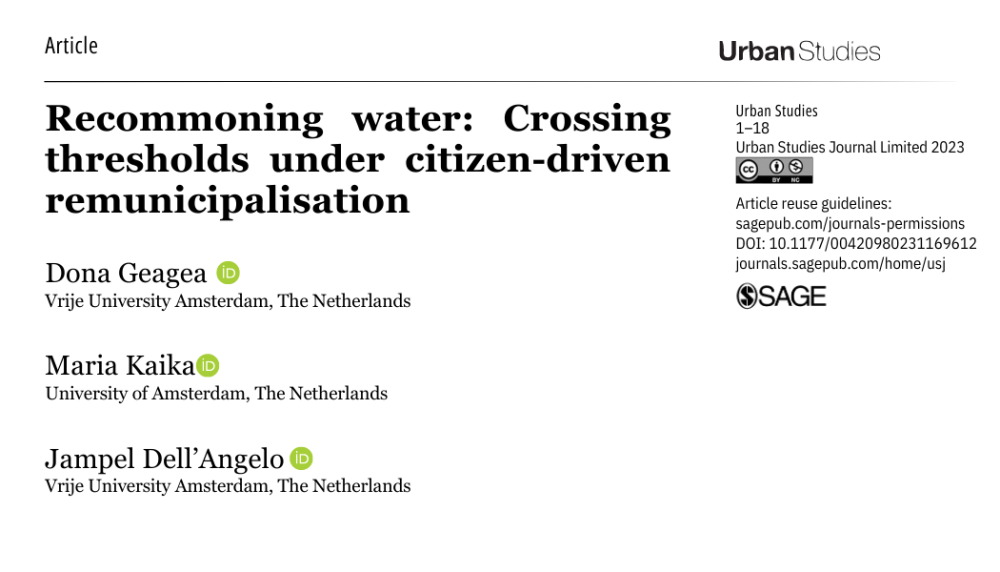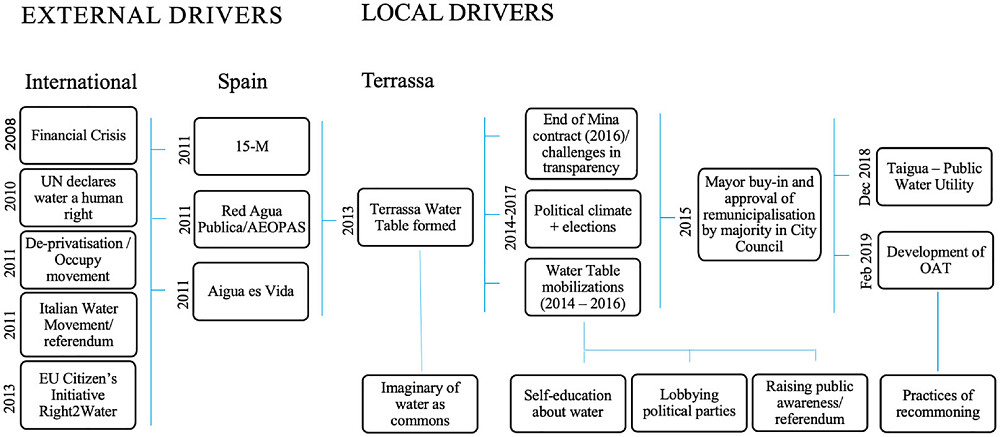Article Review | Recommoning water: Crossing thresholds under citizen-driven remunicipalisation
In opposition to the neoliberal paradigms of privatisation and commodification of water, remunicipalisation has received attention from water movements in Europe since 2008. The new publication by NEWAVE Early Stage Researcher Dona Geagea (VU Amsterdam) and NEWAVE supervisors Maria Kaika (UvA) and Jampel Dell’Angelo (VU Amsterdam), published in the Urban Studies journal, argues that discussions of remunicipalisation have not sufficiently engaged with questions of recommoning. Thus, the authors center their research around this critically understudied link.
Relating to the reversal of privatisation, remunicipalisation refers to the process of bringing privatised water back under public control. The authors define recommoning as a paradigm where citizens “reclaim resources from public/private enclosure by creating spaces and processes that allow continuous agonistic social relations in order to ensure that resources are shared in common, are used for the common and are reproducing the commons” (p. 3). This interpretation builds on Fournier’s definition to emphasise the reclamation of resources by citizens and the process of transcending the property and power relations governing water in the first place.Given these definitions, the article explores “the conditions under which remunicipalisation processes can lead [...] to designing institutional set-ups that enable citizens to practise recommoning water under remunicipalisation” (p. 3).
The scholars draw useful conceptual distinctions between remunicipalisation, recommoning, and recommoning under remunicipalisation. They answer broad theoretical questions using the case study of the citizen-led water observatory in Terrassa, Spain. Relying on interviews and focus groups as their fieldwork methodology, the scholars identified that water remunicipalisation can act as an important step for enabling processes of recommoning water in urban, complex city-scale contexts.
The transfer of water services from Terrassa’s private water utility company Mina Pública d’Aigües de Terrassa, S.A. to Taigua, the new public water utility, was itself a result of national movement for water remunicipalisation and bottom-up, collective action from activists in Terrassa. The authors cite this instance as an example of an institutional bricolage, understood as the creation of new institutional arrangements due to creative adaptation by actors. Activists were furthermore convinced that an autonomous body for civic deliberation in water-related decisions was required beyond remunicipalisation.
Figure 1. External and local drivers (factors and actors) for Terrassa’s successful establishment of OAT (authors’ elaboration) (adapted from Geagea et al., 2023)
Thus, the Terrassa’s citizen water observatory (Observatori de l’Aigua de Terrassa – OAT) was created, which the authors argue is a case of successful recommoning under remunicipalisation. The remunicipalisation of water services in Terrassa is an example of a threshold - an interruption that created the space for three main transitions (identified by the authors): (1) a public to a commons paradigm; (2) from hierarchical ways of doing to co-production; and (3) enclosed spaces to intersectional ones.
Activists in Terrassa opened up public spaces for collective use and adopted practices that assured that resources are shared in common, used for the common, and reproducing the commons. The OAT was built on a structure of rotating involvement, preventing the accumulation of power. It also aspires to remain an open space welcoming newcomers, outside the pressures of racism and classism, although is currently dominated by white working or retired people with the ‘privilege to volunteer’ their time.
Nevertheless, the authors find that institutionalisation of such processes under a public management regime is confronted with multifaceted tensions. With the OAT, one of these tensions is the expectation from the public body and the municipality to perform within the hierarchical structures that the water observatory attempts to dismantle. The municipality, in institutionalising the OAT, tends to see the autonomous body as a service of the municipality, and outsources tasks onto the observatory, impeding the sustainability of this volunteer-based organisation. Institutionalisation threatens to exclude members of the civic body that may not wish to deal with state authorities. Furthermore, sceptical perspectives towards OAT's legitimacy might push its members to devote more time to proving their role and importance than performing their tasks.
While these tensions merit further attention from both activists and policymakers, it is also important to consider other possible alternative models of water governance and not treat the case of Terrassa as a panacea. Considering these undisciplined possibilities, the authors remark, is crucial to reclaiming water as a commons.
Read the full article here: Geagea, D., Kaika, M., & Dell’Angelo, J. (2023). Recommoning water: Crossing thresholds under citizen-driven remunicipalisation. Urban Studies, 0(0). https://doi-org.vu-nl.idm.oclc.org/10.1177/00420980231169612 [link]






